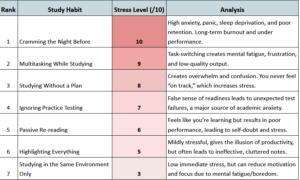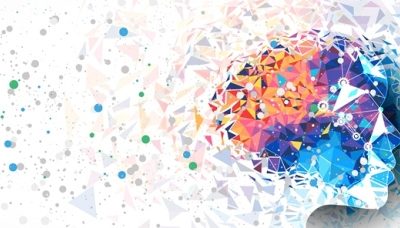With the new academic year underway in both schools and universities, searches for ‘AI study tools’ have soared over 5,000% according to Google Trends.
RELATED: Why AI education should be integrated into Nigeria’s school curriculum
As technology becomes increasingly prevalent in education, the AI prompt experts AIPRM have utilised AI to uncover which study habits are leading to poor exam results. Christoph C. Cemper, founder of AIPRM shares expert commentary on how these tools can act as a powerful ally in breaking bad habits and personalising study approaches, while also warning against the risks of over-reliance.
Most stressful ineffective study habits leading to poor exam results

*AI prompt experts AIPRM asked AI to analyse and rank bad study habits out of ten by stress level. The ranking is on a scale of 1 to 10, where 10 = extremely stressful and 1 = minimal stress.
Cramming the night before ranks as the most stressful study habit, scoring a full 10/10 on the stress scale. A recent study revealed that 32% of British students admitted to cramming to get through exams and that this approach is increasing despite its negative impact on results and mental health.
A healthier alternative to this method is the spaced repetition technique. For example, using flashcards daily can strengthen long-term memory and reduce last-minute panic.
Multitasking whilst studying is second, scoring 9/10 on the stress scale. Switching between tasks can contribute to increased fatigue, which drives low level output and inherent frustration. Instead, students may want to try monotasking with Pomodoro Technique, to ensure they focus on one task at a time, for 25 minute intervals to maintain concentration.
In third, studying without a plan scores 8/10 on the stress scale. This can create a sense of overwhelming confusion, leaving students unclear on what to do next. To rectify this, create a study schedule with daily goals and priority topics. This can improve the structure of study sessions and thereby, reduce stress and confusion.
Christoph C. Cemper, founder of AIPRM provides expert insight on how AI can become an effective study ally to personalise study approaches, whilst warning students at all levels to avoid over-reliance:
“As we begin the new academic year, AI is more prevalent in education than ever before. Schools and universities are using AI to plan lessons, create learning resources, grade work, and complete admin tasks. Meanwhile, students are turning to AI to help simplify topics, support revision, give feedback on work, and assist with research. In fact, a study of university students across 16 countries revealed that almost nine in ten students (86%) use AI in their studies.”
“When used effectively, AI can be a helpful tool for both students and teachers, improving efficiency, study technique, and enhancing resources.The challenge is making sure students do not become over-reliant. AI should be used to think with students, not for them. Relying on it to do the work carries a long list of risks, including weaker critical thinking and learning skills, poor knowledge retention, lack of references for information, and potentially plagiarism or disciplinary issues.”
“That’s why I’d always recommend that institutions put clear safeguards in place when it comes to student use of AI. Building a healthy academic relationship between students and AI is as much the responsibility of the students as it is the schools and universities. As AI use continues to grow in education, so should the regulations, knowledge and literacy surrounding the tools.”
Credit: AIPRM
COVER PHOTO: L’Etudiant Africain

































